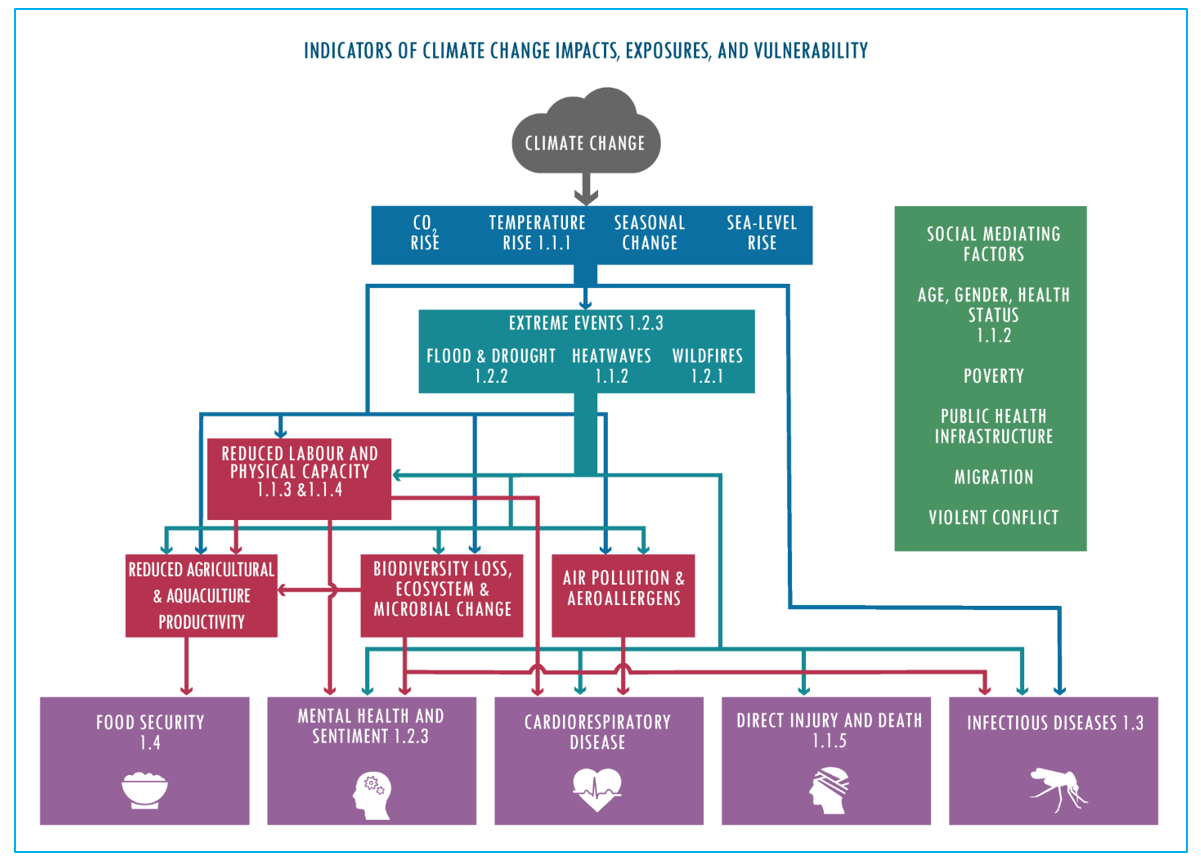Climate change is affecting people’s health globally directly with increased exposure to extreme weather and indirectly with impacts on the physical, natural, and social systems on which health depends (1). Climate changes are also amplifying the existing threats to food and water security, built infrastructure, essential services, and livelihoods.
 Source: Impact of Climate Change on Human Health (Adapted from CDC)
Source: Impact of Climate Change on Human Health (Adapted from CDC)
Climate change has a number of impacts on human health. Some of the major health threats due to climate change include:
Heatwaves: Climate change is raising average global temperatures as well as the frequency, intensity and duration of heatwaves (2). Exposure to extreme heat is linked to acute kidney damage, heatstroke (3), adverse pregnancy outcomes (4) (5), disrupted sleep patterns (6), negative effects on mental health, worsening of existing cardiovascular and respiratory illness and an increase in non-accidental and injury-related mortality (7). Older persons, pregnant women, newborn babies, people who are socially isolated, and those who work outside are more vulnerable (8) (9).
Infectious Disease Transmission: Climate change is having an impact on the spread and transmission of many infectious diseases, including vector-borne, food-borne and waterborne diseases. The suitability for transmission of many infectious diseases is influenced by shifts in temperature and precipitation. The range of disease-carrying insects, such as mosquitoes and ticks, is expanding as temperatures warm. This increases the risk of diseases such as malaria, dengue, Lyme disease, and others. Changes in precipitation patterns and increased frequency of floods can lead to contamination of water sources, resulting in the spread of water-borne diseases such as cholera and typhoid.
 Source: Climate change impacts, Exposures and Vulnerability (10).
Source: Climate change impacts, Exposures and Vulnerability (10).
Mental health: Climate change is affecting mental health, psychological wellbeing and their social and environmental determinants (1). Globally, mental health problems are on the rise. In the last decade, there has been a 13% increase in mental health conditions and substance use disorders, primarily due to demographic changes (to 2017). Mental health problems now account for 1 in every 5 years of disability. According to World Health Organization, suicide is the second leading cause of death among 15-29-year-olds, affecting approximately 20% of the world's children and adolescents.
Food Security and undernutrition: Compared with 1981–2010, increased temperatures in 2021 shortened crop growth seasons. globally by 9·3 days for maize, 1·7 days for rice, and 6·0 days for winter and spring wheat, and heatwave days were associated with 98 million more people reporting moderate to severe food insecurity in 2020 (1).
These data sources provide access to additional data, reports, and resources on the health impacts of climate change, including information on specific health risks, health sector preparedness and response, and policy recommendations for action. By using these sources, you can stay informed about the latest developments in this important area of research and practice.
This website was produced with the support of the United States Agency for International Development (USAID) under the terms of USAID's Research for Decision Makers (RDM) Activity cooperative agreement no. AID-388-A-17-00006
Views expressed herein do not necessarily reflect the views of the U.S. Government or USAID. icddr,b is also grateful to the Governments of Bangladesh, Canada, Sweden and the UK for providing unrestricted/institutional support
68, Shaheed Tajuddin Ahmed Sarani Mohakhali, Dhaka 1212, Bangladesh
icddr,b is located at the Mohakhali area in Dhaka, just ask your driver for the "Cholera Hospital"
